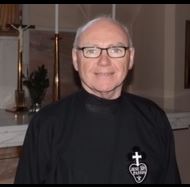This coming Monday we will celebrate the feast of the Passionist, Saint Gabriel of Our Lady of Sorrows, whose statue stands to the left of the sanctuary in St. Mungo’s, next to St. Enoch, St. Mungo’s mother. I first visited the shrine of St. Gabriel in Italy in 1982 while attending our Passionist General Chapter and studying in Rome. It would normally have been a very long journey but at the time the Italians were constructing a tunnel, called the Traforo del Gran Sasso, as part of the A24 Motorway that links Rome and the Adriatic Sea via L'Aquila and Teramo. If I remember correctly, the tunnel was to be 13 kilometres long and pass through the Apennine Mountains via the Gran Sasso in Abruzzo where the shrine of St. Gabriel was, at the Passionist Retreat of Isola del Gran Sasso where Gabriel died of tuberculosis on 27th February 1862, the day before his 24th birthday.
The tunnel, an extraordinary feat of engineering which the Italians excel at, was still under construction, in fact it wouldn’t open until 1984, but it was sufficiently complete for one of our well known and respected Passionist Religious who resided at the shrine to acquire special permission from the authorities to bring a bus load of international participants from our General Chapter through the tunnel and thus cut a significant length of time off the journey. It was wintertime and I remember when we emerged from the tunnel at the far end there was plenty of crisp, deep snow on the mountains and some of our Passionists from the Philippines had never experienced snow before, so we had to stop the bus to let them get out and touch it, ensuing in a rather undignified snowball fight. On arriving at the shrine I was struck by the number of young people there visiting, but then Saint Gabriel is a patron of youth, students, seminarians and clerics; as well as of the Abruzzi region.
I am prompted to remember that, when I was a child, my father worked for a time on the construction of the Clyde Tunnel. For those who may not know, it was decided to build a tunnel to replace two ferries across the river which had ceased operations. They went under the river because the level of shipbuilding at that particular section of the Clyde made it impractical to build a bridge. It was ironic that my father only worked on it because he had been made redundant from the shipyards, and sadly he had died by the time the tunnel was opened in 1962. Work had begun in 1957. He died in 1960 but for the year prior to that he had been working in the steel works in Consett, County Durham.
When the Clyde Tunnel first opened, and perhaps still, a favourite game of children was to try and hold their breath from the time their car entered the tunnel until it emerged at the other side. It is estimated that a car going at 30mph would take 57 seconds to travel the 762 metres of tunnel. Holding breath for that length of time was just about impossible and it was made all the harder when some cruel relatives and friends would deliberately drive slower when the car got near to the other side. I’m always fascinated that one of the recurring problems is graffiti, even in an underwater tunnel, the eradication of which only ever lasts a few days before the graffiti reappears.
The Clyde Tunnel is obviously much shorter than the Traforo del Gran Sasso, 762 metres as compared to 13 kilometres, and I estimate that if you tried to hold your breath at 30mph during a 13 kilometre journey you would be holding it for just a little over 16 minutes, definitely not to be recommended. Anyone who has passed through that tunnel, and is still alive, wisely didn’t attempt it.
Going through a tunnel and emerging is often a metaphor for the journey from darkness to light; from death to new life, nowhere better expressed than in John Henry Newman’s beautiful hymn:
Lead, kindly Light, amid the encircling gloom, lead thou me on!
The night is dark, and I am far from home; lead thou me on!
Keep thou my feet; I do not ask to see the distant scene; one step enough for me.
I was not ever thus, nor prayed that thou shouldst lead me on;
I loved to choose and see my path; but now lead thou me on!
I loved the garish day, and, spite of fears, pride ruled my will: remember not past years!
So long thy power hath blessed me, sure it still will lead me on.
O'er moor and fen, o'er crag and torrent, till the night is gone,
And with the morn those angel faces smile, which I have loved long since, and lost awhile!

 RSS Feed
RSS Feed
